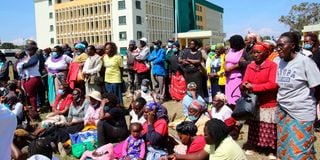UK heightens lobbying for defence treaty as Laikipia locals protest

Lolldaiga community members outside the Nanyuki Law Courts during proceedings on October 3, 2022, in a case where the British Army is accused of starting a fire at the Lolldaiga Conservancy on March 21, 2021.
The British government has commenced a fresh round of intense lobbying as it seeks to renew the Defence Cooperation Agreement (DCA) but faces opposition from some Laikipia residents.
British Minister for Armed Forces James Heappey is spearheading the lobbying, having made four trips to Kenya over the last one year.
His most recent visit was barely two weeks ago when he held meetings with Defence Cabinet Secretary Aden Duale and top military officials.
The UK is keen to see through the new deal, which was signed more than a year-and-a-half ago by former CS Monica Juma, now a senior adviser in President William Ruto’s government, and her British counterpart Ben Wallace, and subsequently ratified by the UK parliament.
The Kenyan parliament is, however, yet to ratify the new deal, leaving the British army legally exposed as it continues to train in Kenya without a contract, following the expiry of the 2016 DCA last year. During his visit two weeks ago, the UK minister expressed confidence that the deal would sail through following talks with Kenya’s defence officials.
“The DCA lays out the legal basis on which we use land for training and the payments made. We were not able to get it ratified in the last parliament, but it is my understanding that it is going to be brought back,” Mr Heappey said.
The Saturday Nation has learnt that Mr Duale has issued a memo forwarding the agreement for ratification by Parliament. In the background, the British Army Training Unit (Batuk), which will be the biggest beneficiary of the deal, has heightened corporate social responsibility activities and community engagement over the last one month.
For instance, between November 1 and December 6, 2022, Batuk conducted 11 of such activities that included donating learning materials, putting up infrastructure for schools and the communities and even hosting a live training simulation for local media.
The aggressive engagements are seen as part of the British Army’s efforts to gain trust from the locals, away from the political engagement to get the military contract renewed.
For the British government, the DCA is critical because not only does it provide its troops access to training grounds with uniquely similar topography to real world battlefields, it also gives it an upper hand in terms of military presence in East Africa.
Last year the UK government set up a Sh9 billion (£70 million) military base in Nanyuki to serve as an army barracks and weapons depot. Up to six infantry battalions train there each year. Besides the military benefits, the presence of Batuk is vital for business involving local conservancies in Laikipia under the management of British nationals.
In reports submitted during the petition hearings into the wildfire at Lolldaiga Hills, the British Army said it had been paying to train in the conservancy and others around Laikipia.
Despite the aggressive lobbying, the DCA is facing heavy opposition from a section of Laikipia locals, who have given certain conditions to be met before the deal is ratified. One of them is public participation so that they can give their views.
Lawyer Kelvin Kubai argues that because the British troops will be based in Laikipia, the locals should also have a say on the rules of engagement. “The locals are the immediate neighbours of the soldiers, so whatever they do will affect them directly. It is unfair and irresponsible to ignore their views,” he said.
Having failed to be ratified in the last parliament, the proposers of the deal were sent back to the drawing board, especially for the parliamentary process. “That process must be started all over and that includes public participation. It makes no sense for some MPs from other regions to be making decisions that affect the people of Laikipia without involving them or even their leaders. Not even the local MPs and MCAs have been involved in this process, which is illegal,” Mr Kubai said.
Already, the Laikipia government has written to the parliamentary Committee on Defence and Foreign Relations, urging MPs to first seek the views of the public and other stakeholders before renewing the partnership. In the two instances that the county attorney has written to MPs, the March 2021 wildfire at Lolldaiga Conservancy and the 2012 murder of Agnes Wanjiru have been cited as unresolved pertinent issues.
“The Previous Defence Corporation Agreement [signed in October 2016] had established the Intergovernmental Liaison Committee to hear disputes arising out of the existence of the Batuk,” says a letter from County Attorney Alex Muchemi that is copied to Governor Joshua Irungu.
“However, the committee has never been operationalised and has no physical address, which makes it impossible for any citizens affected to petition or be heard.”
The Intergovernmental Liaison Committee is handling a petition by locals of Lolldaiga over the fire and has allowed for submission of compensation claims. More than 5,000 claims have been filed.
Wanjiru’s murder case has, however, gone cold, with UK minister Heappey revealing that probes have not started—more than a year after he promised the murder suspect would be extradited to Kenya for trial.
The two issues were leveraged as conditions to be met for the ratification of the DCA by Kenyan MPs.





